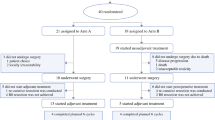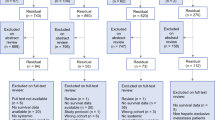Abstract
Background
We have previously shown promising activity of hepatic arterial infusion (HAI) oxaliplatin combined with intravenous (IV) 5-fluorouracil (5-FU) and leucovorin (LV) as first-line chemotherapy in patients with colorectal liver metastases (CRLM) (intent-to-treat [ITT] objective response rate [ORR], 64%; secondary resection rate, 18%; overall survival [OS], 27 months). Whether this regimen could be beneficial after systemic chemotherapy failure is unknown.
Methods
Patients with unresectable CRLM and history of systemic chemotherapy failure were treated bimonthly with HAI oxaliplatin (100 mg/m2 2 hours) combined with IV LV and IV bolus and infusional 5FU (modified LV5FU2 regimen).
Results
Forty-four consecutive patients (median age 56 years; median number of prior systemic chemotherapy regimens, 2 range 1–5) were included, of whom 43 (98%) had previously received oxaliplatin (n = 34), irinotecan (n = 37), or both (n = 28). Patients received a median of nine cycles of HAI oxaliplatin and IV modified LV5FU2 (range 0–25). Toxicity included grade 3–4 neutropenia (43%), grade 2–3 neuropathy (43%), and grade 3–4 abdominal pain (14%). We observed 24 partial ORs (62%) among the 39 assessable patients (ITT ORR, 55%; 95% CI, 40–69%), including 17, 12, and 12 patients who had failed to respond to prior systemic chemotherapy with FOLFIRI, FOLFOX, or both, respectively. Tumor response allowed further R0 surgical resection (n = 7) or radiofrequency ablation (n = 1) of initially unresectable CRLM in eight patients (18%). Median progression-free survival and OS were 7 and 16 months, respectively.
Conclusions
HAI oxaliplatin and IV LV5FU2 is feasible, safe, and shows promising activity after systemic chemotherapy failure, allowing surgical resection of initially unresectable CRLM in 18% of patients.


Similar content being viewed by others
References
Breedis C, Young C. The blood supply of neoplasm in the liver. Am J Pathol 1954; 30:969–74
Chen GHG, Gross JF. Intra-arterial infusion of anticancer drugs: theoretic aspects of drug delivery and review of responses. Cancer Treat Rep 1980; 64:31–40
Meta-Analysis group in Cancer. Reappraisal of hepatic arterial infusion in the treatment of nonresectable liver metastases from colorectal cancer. J Natl Cancer Inst 1996; 88:252–8
Kerr DJ, McArdle CS, Ledermann J, et al. Intrahepatic arterial versus intravenous fluorouracil and folinic acid for colorectal cancer liver metastases: a multicentre randomised trial. Lancet 2003; 361:368–73
Tournigand C, André T, Achille E, et al. FOLFIRI followed by FOLFOX6 or the reverse sequence in advanced colorectal cancer: a randomized GERCOR study. J Clin Oncol 2004; 22:229–37
Goldberg RM, Sargent DJ, Morton RF, et al. A randomized controlled trial of fluorouracil plus leucovorin, irinotecan, and oxaliplatin combinations in patients with previously untreated metastatic colorectal cancer. J Clin Oncol 2004; 22:23–30
Colucci G, Gebbia V, Paoletti G, et al. Phase III randomised trial of FOLFIRI versus FOLFOX4 in the treatment of advanced colorectal cancer: a multicenter study of the Gruppo Oncologico Dell’Italia Meridionale. J Clin Oncol 2005; 23:4866–75
Köhne CH, van Cutsem E, Wils J, et al. Phase III study of weekly high-dose infusional fluorouracil plus folinic acid with or without irinotecan in patients with metastatic colorectal cancer: European Organisation for Research and Treatment of Cancer Gastrointestinal Group Study 40986. J Clin Oncol 2005; 23:4856–65
Rothenberg ML, Oza AM, Bigelow RH, et al. Superiority of oxaliplatin and fluorouracil-leucovorin compared with either therapy alone in patients with progressive colorectal cancer after irinotecan and fluorouracil-leucovorin: interim results of a phase III trial. J Clin Oncol 2003; 21:2059–69
Ulrich-Pur H, Kornek GV, Fiebiger W, et al. Multicenter phase II trial of dose-fractionated irinotecan in patients with advanced colorectal cancer failing oxaliplatin-based first-line combination chemotherapy. Ann Oncol 2001; 12:1269–72
Park SH, Sung JY, Han SH, et al. Oxaliplatin, folinic acid and 5-fluorouracil (FOLFOX-4) combination chemotherapy as second-line treatment in advanced colorectal cancer patients with irinotecan failure: a Korean single-center experience. Jpn J Clin Oncol 2005; 35:531–5
Cunningham D, Humblet Y, Siena S, et al. Cetuximab monotherapy and cetuximab plus irinotecan in irinotecan-refractory metastatic colorectal cancer. N Engl J Med 2004; 351:337–45
Kemeny NE, Niedzwiecki D, Hollis DR, et al. Hepatic arterial infusion versus systemic therapy for hepatic metastases from colorectal cancer: a randomized trial of efficacy, quality of life, and molecular markers (CALGB 9481). J Clin Oncol 2006; 24:1395–1403
Ducreux M, Ychou M, Laplanche A, et al. Hepatic arterial oxaliplatin infusion plus intravenous chemotherapy in colorectal cancer with inoperable hepatic metastases: a trial of the gastrointestinal group of the Fédération Nationale des Centres de Lutte Contre le Cancer. J Clin Oncol 2005; 23:4881–7
Conroy T, Gory-Delabaere G, Adenis A, et al. Clinical practice guideline: (2003) update of Standards, Options et Recommendations for first line palliative chemotherapy in patients with metastatic colorectal cancer (summary report). Bull Cancer 2004; 91:759–68
Levi F, Perpoint B, Garufi C, et al. Oxaliplatin activity against metastatic colorectal cancer. A phase II study of 5-day continuous venous infusion at circadian rhythm modulated rate. Eur J Cancer 1993; 29A:1280–4
WHO Handbook for Reporting Results of Cancer Treatment. World Health Organization, Geneva, Switzerland, 1979
Simon R. Optimal two-stage designs for phase II clinical trials in oncology. Control Clin Trials 1989; 10:1–10
Kaplan EL, Meier P. Nonparametric estimation from incomplete observations. J Am Statist Assoc 1958; 53:457–81
Kemeny N, Jarnagin W, Paty P, et al. Phase I trial of systemic oxaliplatin combination chemotherapy with hepatic arterial infusion in patients with unresectable liver metastases from colorectal cancer. J Clin Oncol 2005; 23:4888–96
Kemeny N, Gonen M, Sullivan D, et al. Phase I study of hepatic arterial infusion of floxuridine and dexamethasone with systemic irinotecan for unresectable hepatic metastases from colorectal cancer. J Clin Oncol 2001; 19:2687–95
Rougier P, Laplanche A, Huguier M, et al. Hepatic arterial infusion of floxuridine in patients with liver metastases from colorectal carcinoma: long-term results of a prospective randomized trial. J Clin Oncol 1992; 10:1112–8
Kern W, Beckert B, Lang N, et al. Phase I and pharmacokinetic study of hepatic arterial infusion with oxaliplatin in combination with folinic acid and 5-fluorouracil in patients with hepatic metastases from colorectal cancer. Ann Oncol 2001; 12:599–603
Dzodic R, Gomez-Abuin G, Rougier P, et al. Pharmacokinetic advantage of intra-arterial hepatic oxaliplatin administration: comparative results with cisplatin using a rabbit VX2 tumor model. Anticancer Drugs 2004; 15:647–50
van Riel JM, van Groeningen CJ, Kedde MA, et al. Continuous administration of irinotecan by hepatic arterial infusion: a phase I and pharmacokinetic study. Clin Cancer Res 2002; 8:405–12
van Riel JM, van Groeningen CJ, de Greve J, Gruia G, Pinedo HM, Giaccone G. Continuous infusion of hepatic arterial irinotecan in pretreated patients with colorectal cancer metastatic to the liver. Ann Oncol 2004; 15:59–63
Mancuso A, Giuliani R, Accettura C, et al. Hepatic arterial continuous infusion (HACI) of oxaliplatin in patients with unresectable liver metastases from colorectal cancer. Anticancer Res 2003; 23:1917–22
Aldrighetti L, Arru M, Angeli E, et al. Percutaneous versus surgical placement of hepatic artery indwelling catheters for regional chemotherapy. Hepatogastroenterology 2002; 49:513–7
Acknowledgment
Drs. Valérie Boige, David Malka, and Michel Ducreux declare having received consultancies, honoraria, and grants/funding (for other studies) from Sanofi-Aventis. Dr. Dominique Elias declares having received grants/funding (for other studies) from Sanofi-Aventis.
Author information
Authors and Affiliations
Corresponding author
Rights and permissions
About this article
Cite this article
Boige, V., Malka, D., Elias, D. et al. Hepatic Arterial Infusion of Oxaliplatin and Intravenous LV5FU2 in Unresectable Liver Metastases from Colorectal Cancer after Systemic Chemotherapy Failure. Ann Surg Oncol 15, 219–226 (2008). https://doi.org/10.1245/s10434-007-9581-7
Received:
Revised:
Accepted:
Published:
Issue Date:
DOI: https://doi.org/10.1245/s10434-007-9581-7




